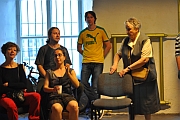tallinn/guudi kildi saal 19.05.2010
description of/satisfaction with:
the independent music scene in tallinn is doing well.
there are many clubs which don’t charge bands to play.
there are many bands and audiences are not picky about genres.
there are many bands, but many you hear about only once. social media creates the impression that there are serious bands, but it is a falsehood created through social networks.
economy:
there is a type of internal scene financial support, but it’s small.
estonia is too small to fully support independent musicians.
the division between independent and commercial is very small in estonia.
one should make music no matter whether one gets paid or not.
what about supporting the musicians?
some bands play for free, which sets a standard preventing other bands from charging a fee.
the average wage and limited population makes it difficult to sustain playing music as a job.
most bands limit themselves to the estonian market.
lyric language is a big question. some estonians will understand english lyrics, other won’t. some write lyrics in english for a potentially wider market appeal. language is a particularly important issue in estonia because of the estonian/russian divide.
there aren’t many bands with political aspirations or political purposes. they just try to make money.
publicity:
most information about shows is distributed social network sites and internet forums.
there are no more posters or zines, nor places to put posters.
the internet is quite a democratic forum for those who have access, and you can screen bands on myspace and other sites.
cross-scene cooperation:
punks want to see bands they like, not just turn out to support bands because they are punk.
the improve scene is part of the larger network of independent scenes, but there is not much cooperation.
much of the potential for a combined scene is thwarted by the estonian/russian division.




